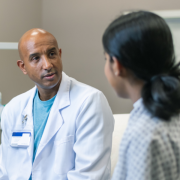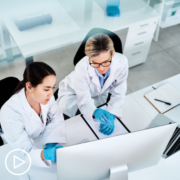Is There Financial Assistance for Myeloma Patients?
Is There Financial Assistance for Myeloma Patients? from Patient Empowerment Network on Vimeo.
Can myeloma patients access financial assistance for their care? Expert Dr. Benjamin Derman shares information about available support and resources to reduce the financial burden on patients.
Dr. Benjamin Derman is a hematologist and oncologist specializing in multiple myeloma at the University of Chicago Medicine Comprehensive Cancer Center. Learn more about Dr. Derman.
See More from Engaging in Myeloma Treatment Decisions
Related Resources:

|

|

|
Transcript:
Katherine:
One final question for you. Jennifer asks, “Many new medications for treatment were mentioned. And I’m sure these could be expensive. What are the options to make these available financially for patients who need them?”
Dr. Derman:
That’s a really good question, and one that we don’t yet have great answers to. As a physician, I don’t receive compensation based on the drugs that I prescribe. And so, I do know – I often have a good sense of what these drugs cost. A lot of the costs that are passed along to patients typically revolve around oral therapies. Even patients who are on Medicare, or sometimes especially patients who are on Medicare. And looking at some of the policy changes that seem to be coming down the pike that include capping Medicare out of pocket costs for medications will be a huge benefit to our myeloma patients.
It’s important to familiarize yourself with different organizations and the financial support that may be available. Just to name a few, and you’re not limited to these, but The Leukemia & Lymphoma Society does a really great job in providing financial support to patients. But there are definitely other programs that can be contacted for this.
And also, a lot of the pharmaceutical companies will actually have patient assistance programs as well. Sometimes it’s as simple as asking your provider, and typically they will have their team look into this for you. But we’re fortunate to have a team of pharmacists and my nurses as well who are used to doing this kind of thing. So, it’s important to look into those as well.








